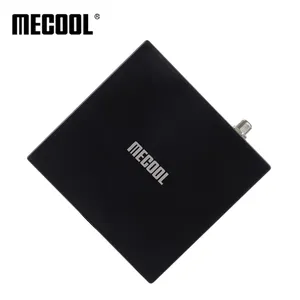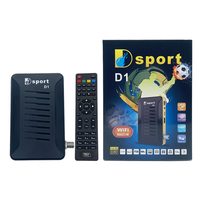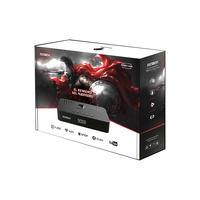
Hd Set Top Box Mini Dvb S2 Receiver Satellite Tv Receiver Digital Set-top Box Tv Tuner Dvb-s2 Decoder

MECOOL KT1 T2 S2 Wholesale Amlogic S905X4 Android 10 DVB T2 S2 PVR TV Box 4K Digital Satellite TV Receiver Decoder




















In the ever-evolving world of satellite television, the choice of a digital satellite receiver decoder is pivotal to the viewing experience. These sophisticated devices not only unlock access to a plethora of channels but also enhance the quality of the content delivered to your screen. With technology advancing rapidly, understanding the features that matter in a receiver decoder is crucial for both tech enthusiasts and the average consumer. This article delves into the essential aspects of digital satellite receiver decoders, from their fundamental operations to the advanced features that set the best apart. We'll guide you through the nuances of signal reception, the importance of resolution and compatibility, and the connectivity options that can transform your TV viewing into a seamless and interactive experience.

Digital satellite receiver decoders are integral components in satellite television systems, facilitating the reception of programming by converting signals relayed from communications satellites to a format suitable for viewing on television sets. These devices are capable of decoding both analog and digital signals, with modern systems predominantly using digital for its ability to support high-definition television and improved spectral efficiency. The technology involves a series of transmissions from an uplink facility to a satellite, which then re-transmits the signals back to Earth. The downlink signal, collected by a parabolic antenna, is directed to the receiver decoder through a low-noise block downconverter (LNB).
The receiver decoder's role is to demodulate and convert the incoming signals into the desired output, which may include television, audio, and data formats. Some receiver decoders also have the capability to unscramble encrypted signals, offering access to premium services. The quality of signal reception can be influenced by factors such as the frequency band used for transmission, with C-band being susceptible to terrestrial interference and Ku-band to rain fade. The selection of a receiver decoder is critical for ensuring reliable access to satellite television services, with considerations for the decoding capabilities, signal reception quality, and compatibility with various transmission standards.

When selecting a digital satellite receiver decoder, it's crucial to consider its core functionalities. A receiver's primary role is to interpret the signal from the satellite and convert it into a format that can be displayed on your television. Look for features such as an onscreen programming guide, which organizes the schedule of broadcasts in an easily navigable interface.
Additionally, modern receivers may offer parental control options, allowing users to restrict certain content based on ratings or specific channels. For those interested in recording live TV, a receiver with a built-in digital video recorder (DVR) is essential. This feature enables pausing and recording of live broadcasts, storing them on an internal hard drive for later viewing.
The battle for superior picture quality has made satellite TV a strong contender, with many receivers offering movie-quality visuals and sound. When comparing options, consider the receiver's compatibility with digital cable, as this technology also offers enhanced picture quality and an extensive channel lineup. The choice between satellite and digital cable will often come down to the specific offerings and bundles provided by the service providers.
Alibaba.com showcases a diverse range of digital satellite receiver decoders catering to various user needs. Among the offerings, there are devices that combine DVB S2 and DVB T2 technologies, allowing for reception of satellite and terrestrial signals. These devices often come with built-in Wi-Fi capabilities, enhancing their connectivity options. Another type available is suitable for regions requiring ISDB-T standard, providing users with access to digital television services.
For those seeking advanced features, the market includes high-resolution recording devices that support multiple input channels. Optical receivers cater to users requiring fiber-to-the-home (FTTH) solutions. Additionally, there are single input channel HD HDMI encoders with RF modulation, suitable for home digital broadcasting setups.
For global satellite reception, devices that support MPEG-4/H.264 DVBS2 standards ensure compatibility with a wide range of satellite broadcasts. There are also decoders tailored to specific regional satellite services offering Full HD 1080P reception. Moreover, there are decoders with built-in Wi-Fi and streaming platform support, providing a seamless streaming experience alongside traditional satellite channels.
Lastly, Alibaba.com also lists innovative solutions that support Full HD through DVB-S2, and devices that add USB Wi-Fi support for additional functionalities. For users interested in both satellite and terrestrial digital signals, there are combo receivers that accommodate multiple signal types in one device.
In the context of digital satellite receiver decoders, resolution plays a pivotal role in the quality of content delivery. A 4K receiver, synonymous with Ultra High Definition (UHD), offers a resolution of approximately 4,000 pixels horizontally, significantly enhancing the detail and realism of the viewing experience compared to the Full HD (1080p) standard. The compatibility of a receiver with this high-resolution content is crucial, as it must be able to process and pass through the signals without degrading quality. This ensures that the visuals remain pristine, providing an immersive experience for viewers.
Moreover, the ability of a receiver to handle the high bandwidth demands of 4K content is a testament to its performance capabilities. As the central hub of a home theater system, a receiver decodes audio and video signals from various sources, including gaming consoles, Blu-ray players, and streaming devices. The inclusion of features such as 4K 120Hz support and 4K receiver passthrough further exemplifies the technological advancements in these devices, offering smoother visuals and simplified connectivity for a seamless entertainment setup.
Satellite receiver decoders enhance the television viewing experience by offering a variety of connectivity options. These devices come equipped with features that allow users to access an onscreen programming guide, which is sourced from the programming schedule signal provided by the service. The integration of such guides facilitates easy navigation through channels and programs. Additionally, some receiver decoders are designed with parental control functions, enabling users to manage viewing options for their households effectively.
Moreover, certain advanced models of receiver decoders include built-in digital video recorders (DVRs). This feature empowers viewers to not only pause live television but also record shows directly onto a hard drive. This capability significantly enhances the user experience by providing the flexibility to watch content at their convenience. The ongoing competition between satellite and digital cable technologies has led to continuous improvements in these devices, ensuring that they cater to the evolving needs of consumers seeking a more connected and personalized television experience.
When selecting a digital satellite receiver decoder, understanding its decoding capabilities and signal reception is crucial. A common issue faced by users is the loss of signal quality, which can be attributed to various factors. For instance, a lack of signal quality indicates a missed step in the installation or setup process, as signal quality is essential for receiving any signal strength. Users should aim for a high signal quality, which is often indicated on the tracking device or decoder.
Moreover, signal strength can be affected even when signal quality is present. Fluctuating or low signal strength may result from improper alignment, environmental factors, or equipment issues. It's important to ensure that the satellite dish is accurately aligned and that the LNB and coaxial cable are functioning correctly. In some cases, the decoder's tuner might be at fault, especially if signal issues arise after deleting and refreshing channel lists.
Additionally, users may experience problems with specific frequencies or channels, which could be due to incorrect frequency settings or a need for a software upgrade. It's essential to verify that the correct frequencies are being used for the desired channels. In the context of Alibaba.com, when looking for a satellite receiver decoder, potential buyers should consider models that offer robust signal reception and effective decoding capabilities to minimize these common issues.
While the material and build quality section was previously not provided, it's important to note that when searching for satellite receiver decoders on Alibaba.com, one should look for devices constructed with durable materials and a robust build to ensure longevity and reliability.

Investing in a quality satellite decoder can significantly enhance the television viewing experience. These devices, designed to receive and convert satellite signals into viewable content, come with a variety of features that cater to different preferences and requirements. Advanced models support high-definition (HD) and 4K viewing, offering superior clarity and detail in the visual content. Additionally, some decoders come with recording capabilities, allowing users to record live TV to enjoy at their convenience.
Connectivity is another crucial aspect, with options such as HDMI and USB ports enabling the connection of additional devices, thereby expanding the functionality of the satellite decoder. An intuitive user interface is also a significant advantage, ensuring ease of use for all family members. Compatibility with various satellite services and channel packages is essential to consider, ensuring that the decoder will work seamlessly with the user's existing setup.
Moreover, the integration of smart features in some satellite decoders reflects the convergence of traditional satellite broadcasting with internet-based streaming services, offering on-demand services and app integration. This expands the usability of the device, making it a central hub for all entertainment needs. By understanding these key features and technological trends, consumers can make an informed decision and select a decoder that aligns with their entertainment preferences, ensuring a satisfying viewing experience.
Navigating Alibaba.com for the best deals on digital satellite receiver decoders involves understanding the variety of options available. The platform offers an array of receivers that are designed to cater to different user needs. When searching, consider the decoding capabilities, such as support for AC3/DST amplifiers and compatibility with 4K 3D content. Look for models that offer a balance between advanced features and cost-effectiveness.
Connectivity is another crucial aspect to consider. Receivers with modern connectivity options, such as Bluetooth and Wi-Fi, offer a contemporary approach to audio and video streaming. For those seeking a more traditional setup, options with Spdif optical and coaxial signals are available. Always check the specifications to ensure the receiver meets your resolution and connectivity requirements.
Lastly, the build quality and material are important for durability. While browsing Alibaba.com, assess the product descriptions for information on the construction of the devices. Durable materials and a robust build can signify a longer-lasting product. Remember to filter your search according to the features that are most important to you, such as the type of audio output, whether it's RCA, 3.5mm auxiliary, or digital. By carefully comparing the features and prices, you can find a satellite receiver decoder that offers the best value for your needs.
Navigating the vast sea of digital satellite receiver decoders can be daunting, but understanding the key features and their benefits is essential for making an informed purchase. High-definition and 4K viewing capabilities, robust recording functions, and versatile connectivity options are just the tip of the iceberg. The right satellite receiver decoder not only ensures reliable access to satellite television services but also brings a high-quality, personalized entertainment experience into your living room. With the insights provided on Alibaba.com's diverse offerings, from the budget-friendly to the feature-rich, consumers are equipped to select a device that aligns with their needs and enhances their viewing pleasure. Remember, investing in a quality satellite receiver decoder is investing in the quality of your entertainment. By considering the decoding capabilities, signal reception quality, and the build of the device, you can find a product that stands the test of time and keeps you at the forefront of the digital broadcasting revolution.